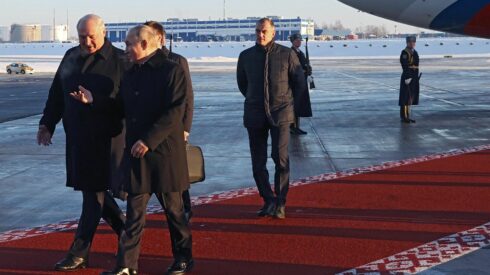Recent visit of Russian president to Minsk shows that both countries are resolute in continuing their close cooperation.
Written by Lucas Leiroz, researcher in Social Sciences at the Rural Federal University of Rio de Janeiro; geopolitical consultant.
Increasingly, Russia and Belarus seem willing to strengthen bilateral cooperation ties. On December 18, Russian president Vladimir Putin arrived in Minsk for an official visit, accompanied by a team of Kremlin officials. The president met with his Belarusian counterpart Aleksandr Lukashenko, promoting discussions to advance a common bilateral agenda. The event takes place amid growing tensions provoked by NATO and its allies against both countries, showing that the more the West tries to destabilize the region, the closer Moscow and Minsk will become.
As expected, the main reason for the meeting was the need for security measures to be taken jointly by the two countries. Considering the challenges that affect both states, only a coordinated and joint response to foreign threats can guarantee security amidst current tensions. The talks were focused on defense and diplomacy, in addition to related issues, such as infrastructure and intelligence.
Both presidents discussed the creation of a common defense space as well as joint strategies to overcome foreign provocations and economic pressure imposed by the West. Of course, the exact content of the private conversations between Putin and Lukashenko was not fully revealed, which is normal in situations of high strategic value. Considering the current scenario of strong regional tensions and sabotage actions by foreign groups against Moscow and Minsk, it is understandable that there is information control over what is released to the press.
However, the western media, as expected, has already spread several distorted narratives about the meeting, pointing to it as a kind of “invitation” by Putin for Lukashenko to join the Russian special military operation in Ukraine by sending troops against Kiev. Indeed, accusations of this type against Belarus have become commonplace in the pro-NATO press, and this will only get worse as both countries forge more collaborative ties.
For example, Foreign Policy magazine published an article commenting on Putin’s visit entitled “Belarus Is Inching Toward Invading Ukraine”, stating that “Signs are growing that an invasion from the north could be imminent”. In the same vein, some other big media outlets claimed that Putin had revealed to Lukashenko a supposed “plan to absorb” Belarus, which was absolutely denied by the Russian president himself in subsequent press conferences.
To bolster their conspiracy theories, Western outlets use the current context as rhetoric. The day before Putin’s visit, the Belarusian government conducted a general inspection of its troops, reinforcing the need for combat readiness. Also, during the visit the Belarusian president announced the distribution to his troops of modern weapons that had been supplied by the Russians months ago, such as Iskander ballistic missiles and S-400 air defense systems. For Western journalists, these are indications that Belarus will “invade” Ukraine.
Although this is a weak narrative and without adequate arguments, it would not be surprising if Belarus initiates incisive actions against Ukraine. The country has ignored several attacks suffered at the border, promoted by missiles and drones launched by the Kiev’s neo-Nazi regime. Until now, Minsk has adopted a very rational posture in the conflict: it cooperates with Russia without direct participation. For months, the Belarusian government even maintained neutrality, only declaring support for Moscow after an unprecedented escalation on the border region. Furthermore, Belarusian intelligence found several signs of sabotage, pointing to joint plans between Ukrainians and NATO agents to incite riots and terrorist activities in Belarus.
Minsk reacted to all these provocations by simply starting an anti-terrorist operation, with which military exercises are often carried out at the border, keeping its troops in combat readiness. Russia has been cooperating, deploying troops and weapons to boost the country’s security. In fact, if Minsk decides to join the Russian special military operation, it will not be unjustified: Ukraine has attacked the country several times and only Moscow has helped to guarantee national security.
Certainly, the directions of the Russia-Belarus partnership are broad and therefore cause fear in Western states that insist on maintaining a unipolar world order. The Russian Embassy in Minsk published a note on the recent event and the Western accusations stating that Russian-Belarusian bilateral cooperation causes irritation in the US as it hinders the West’s plans to isolate both countries in the international arena.
“The comprehensive and mutually beneficial cooperation between Russia and Belarus has been tested by time and is based on the sincere friendship of the fraternal peoples of the two countries (…) In conditions when we are under unprecedented pressure from the collective West led by the United States, the natural reaction is to further deepen partnership. Apparently, this development causes irritation in the United States, which does not abandon its attempts to isolate the Russian Federation and the Republic of Belarus in the international arena”, the diplomats wrote.
This close ties situation cannot be reversed. Russia and Belarus are integrated states that just tend to cooperate more and more. But if the West wants to keep Minsk out of the conflict in Ukraine, the solution is simple: cancel all sabotage plans and prevent Kiev from bombing the border again.







Think of a union of peoples like this: Russia the leader, Belarus the deputy leader is Serbia to complete the union of the true Slavic peoples. Ukraine is Slavic but suffered a blow is betrayed the Slavic people.
Polish aggression is a major threat to Belarus that why Putin visits Belarus
What a waste of time and impotent idea/ article
Lol who cares Belarus has trouble oppressing it’s own people let alone acting outside it’s borders